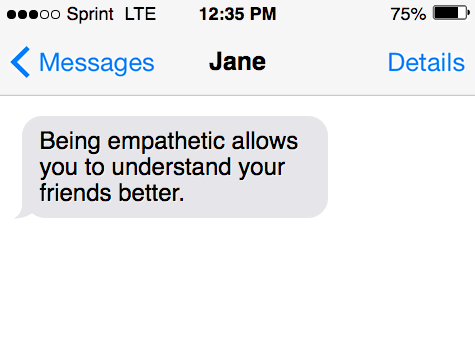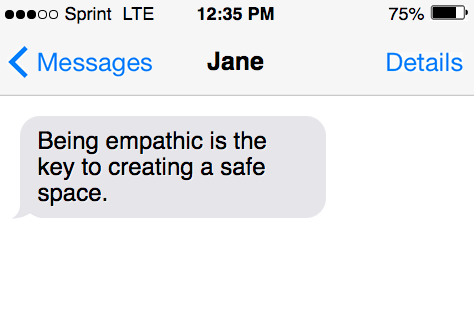What is the difference between “empathetic” and “empathic?” Empathetic and empathic are two words that people use quite often. But there is some debate about which word is correct and whether they mean different things.
Before we begin looking at the definition of them, we must understand that both words mean the same thing…
What is “empathy”
Empathy is a person’s ability to understand another person’s emotions or feelings. Having empathy implies having a sense of understanding others’ emotions.
Everyone has empathy, but the degree of it varies from person to person.
Thus, empathy is the root word from which both the words “empathic” and “empathetic” are derived.
Empathy and sympathy, however, are not the same word. While they both refer to emotions, the two hold very different meanings.

For example:
- Show your friend some empathy. He is going through a very tough time.
- How does a person not feel any empathy for their pets?
- Your pet can show empathy when you feel down.
Definition of “empathic”
The word “empathic” is an adjective for the word “empathy.” It refers to a feeling of empathy for another person or is used to describe someone who has empathy for others.
- Our vet is very empathic and makes my cat feel safe.
- Our new pediatrician is very empathic to my child when he fears injections.
- Sarah’s teacher is so empathic. She understood that Sarah was going through a hard time at school.
Learn more in the definition table below.
| Word | Definition |
| Empathic (adjective) /emˈpaTHik/ | showing an ability to understand and share the feelings of another. |
Definition of “empathetic”
The word “empathetic” is also an adjective for “empathy.” It refers to someone who has empathy for others or a feeling of empathy for others.
Since both the words mean the same thing, you can use either word in a sentence. However, the prevalence of the word “sympathetic” plays the same role as an adjective for “sympathy.”

The word “empathetic” has come to be accepted by more people. This word is also more prevalent because it gives a sense of connection to the colloquially used term “empath.”
However, the term “empath” has not yet officially recognized by any dictionaries (Merriam-Webster includes their definition of “empath” here).
| Word | Definition |
| Empathetic (adjective) /ˌempəˈTHedik/ | showing an ability to understand and share the feelings of another. |
Here are examples:
- The children in my little girl’s class are empathetic towards the disabled.
- My psychiatrist is very empathetic and helps me work through my feelings at my own pace.
- I feel Raymond is very empathetic towards stray animals.
- The government needs to build an empathetic outlook on the plight of immigrants.
Differences between empathic and empathetic
While the two words mean the same thing, some minor differences still set them apart. The main differences between the two words are:
- The word “empathic” is the older word (Its first recorded use goes back to the year 1909).
- The word “empathetic” is the newer version of the word used in the English language. (This word was first used in 1932).
As language evolved through the centuries, many words that were previously used or more commonly used have faded. This is seen in the words “empathic” and “empathetic.”
For example, the word “empathic” is more widely used in science. The scientific community uses the older version of the word rather than the newer one.
How to use “empathic” in sentences
- Developing an empathic outlook is essential to become a successful doctor.
- A good leader understands his followers’ feelings well and is highly empathic.
- Being empathic is the key to creating a safe space.
- You do not become an empathic person overnight.
- John’s empathic nature made him perfect for the job.
How to use “empathetic” in sentences
- Being empathetic allows you to understand your friends better.
- Surround yourself with an empathetic group of friends who can make you feel less lonely when you are down.
- Parents should be empathetic to a child’s feelings instead of dismissing them.
- A good teacher is empathetic towards the needs of her students.
- An empathetic doctor can make a massive difference in someone’s life.
- An empathic approach to training can motivate people to learn better.
- My gym instructor is very empathetic. He teaches everyone with great care and does not push too hard.
Conclusion
The words empathic and empathetic can both be used in a sentence interchangeably. It does not matter which context they are referring to, as either make sense.
The scientific community prefers “empathic” over “empathetic.”
And regarding the meaning of the words, both empathic and empathetic are adjectives of the word empathy.
Inside this article
Fact checked:
Content is rigorously reviewed by a team of qualified and experienced fact checkers. Fact checkers review articles for factual accuracy, relevance, and timeliness. Learn more.
Core lessons
Glossary
- Abstract Noun
- Accusative Case
- Anecdote
- Antonym
- Active Sentence
- Adverb
- Adjective
- Allegory
- Alliteration
- Adjective Clause
- Adjective Phrase
- Ampersand
- Anastrophe
- Adverbial Clause
- Appositive Phrase
- Clause
- Compound Adjective
- Complex Sentence
- Compound Words
- Compound Predicate
- Common Noun
- Comparative Adjective
- Comparative and Superlative
- Compound Noun
- Compound Subject
- Compound Sentence
- Copular Verb
- Collective Noun
- Colloquialism
- Conciseness
- Consonance
- Conditional
- Concrete Noun
- Conjunction
- Conjugation
- Conditional Sentence
- Comma Splice
- Correlative Conjunction
- Coordinating Conjunction
- Coordinate Adjective
- Cumulative Adjective
- Dative Case
- Determiner
- Declarative Sentence
- Declarative Statement
- Direct Object Pronoun
- Direct Object
- Diction
- Diphthong
- Dangling Modifier
- Demonstrative Pronoun
- Demonstrative Adjective
- Direct Characterization
- Definite Article
- Doublespeak
- False Dilemma Fallacy
- Future Perfect Progressive
- Future Simple
- Future Perfect Continuous
- Future Perfect
- First Conditional
- Irregular Adjective
- Irregular Verb
- Imperative Sentence
- Indefinite Article
- Intransitive Verb
- Introductory Phrase
- Indefinite Pronoun
- Indirect Characterization
- Interrogative Sentence
- Intensive Pronoun
- Inanimate Object
- Indefinite Tense
- Infinitive Phrase
- Interjection
- Intensifier
- Infinitive
- Indicative Mood
- Participle
- Parallelism
- Prepositional Phrase
- Past Simple Tense
- Past Continuous Tense
- Past Perfect Tense
- Past Progressive Tense
- Present Simple Tense
- Present Perfect Tense
- Personal Pronoun
- Personification
- Persuasive Writing
- Parallel Structure
- Phrasal Verb
- Predicate Adjective
- Predicate Nominative
- Phonetic Language
- Plural Noun
- Punctuation
- Punctuation Marks
- Preposition
- Preposition of Place
- Parts of Speech
- Possessive Adjective
- Possessive Determiner
- Possessive Case
- Possessive Noun
- Proper Adjective
- Proper Noun
- Present Participle
- Prefix
- Predicate



